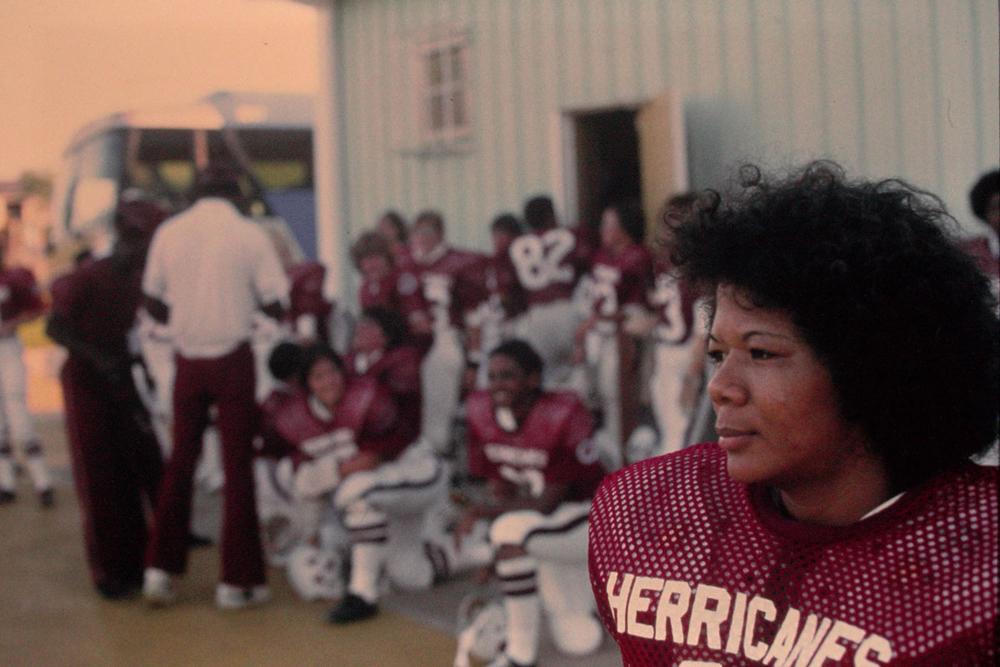“It’s the one sport that doesn’t work if it’s not diverse,” Dr. Jen Welter says of football in “The Herricanes,” after having to fight hard for her own place in the game before eventually breaking through to become a defensive coaching intern for the Arizona Cardinals. You might not think about this before Dr. Welter starts talking about various positions from linebacker to running back to kicker that all require speed and strength yet have completely different skillsets, but then again there are a lot of things that have just been accepted as part of the sport that come into question in Olivia Kuan’s alternately heartwarming and provocative look back and look forward at the history of women’s professional football.
Kuan has an irresistible way into the story as the daughter of Basia Haszlakiewicz, a former member of the Houston Herricanes whose glorious heyday ran from 1976-1979 after a handful of teams formed the National Women’s Football League in the midwest. As the director recalls in voiceover, “I grew up thinking everyone’s mom played football,” but she was in for the kind of rude awakening Basia might’ve delivered to an opponent trying to run against her, watching the league perish due to a lack of sustainable financial support and an uneven playing field when it came to outside expectations. While Kuan finds there was limited documentation of the games when there could be barely enough money around to suit up the players and crowds could be made up more of hecklers than actual fans, the passion of the former Herricanes who can vividly recall their playing days is evidence enough of what the league meant as much for future legitimacy of the sport as it was for themselves.
When there’s a grander outcome at stake than the individual games at hand, Kuan and editor Susan K. Hoover come across a lively structure for the film, only loosely tied chronologically to the Herricanes’ run and eliciting the excitement of a kickoff return that ends in a touchdown where it zigs and zags between the past and present day, spending as much time with those who have built upon the example set by them in Dr. Welter and the Houston Energy, an all-female squad who has made it onto the field for over 20 seasons now. Regardless of era, Kuan finds engaging characters left and right, with the Herricanes themselves appearing ready made to star in a “Bad News Bears”-style series recounting their exploits when you’ve got such unforgettables as Rose Kelley, a defensive tackle who only came onto the team after being spotted walking in the park where the team was forced to practice, and the sisters Monkey and Peaches Kirk, once feared enough by a rival squad that two separate ambulances were set up with their names on them on the side of the field (though this anecdote is curiously remembered differently depending which locker room you were in).
Although envisioning large-scale progress through an endearingly personal lens would seem to come effortlessly to Kuan after growing up with the perspective that she did from her mother, the filmmaker remarkably never strains to include conversations about Title IX, a hot topic of debate when the team played in the mid-‘70s and expands its considerations of equity to the entire way sports are framed in the culture, including a section devoted to the pioneering Houston broadcaster Anita Martini, who worked her way to becoming a trusted voice in the all-male field and made sure to give the Herricanes air time. Ultimately, ideas about diversity may start with gender in “The Herricanes” yet it grows into a consideration of how all these things are connected to one another and for as entertaining as it is, the film may be most resonant about how powerful a community can be when it comes together, whether it’s in the form of a football team or an entire culture understanding what everyone can bring to the table.
“The Herricanes” does not yet have U.S. distribution.




